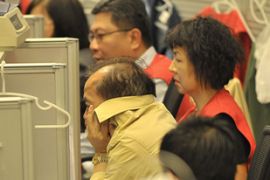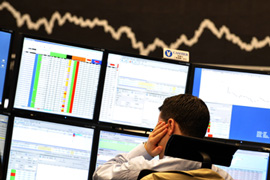Markets devastated in Lehman’s wake
Asian shares plummet as global fallout from US investment bank’s collapse deepens.

The early carnage in Asia followed a devastating Monday for global stock markets which dropped sharply after a triple blow from Wall Street.
Lehman, the fourth-largest investment bank in the US, declared bankruptcy on Monday while Merrill Lynch, another major player, was reportedly being sold off to Bank of America.
AIG, one of the world’s biggest insurance companies, lost half of its value on the stock markets following reports it had asked the US Federal Reserve for a $40bn bridging loan.
The crisis touted as a re-shaping of the US financial landscape knocked down markets across Asia in one of the most explosive 48-hour period in the financial world.
Plunging shares
Tokyo’s benchmark Nikkei plunged 5 per cent to a three-year low as investors dumped financial shares, prompting Japan’s central bank to quickly issue a statement saying it would carefully watch the development and take appropriate measures to stabilise the market.
China’s main stock index tumbled more than 3 per cent in the opening minutes of trading but analysts said a surprise monetary easing announced a day earlier by China’s central bank was likely to limit falls, and could help the index close above 2,000 points.
The Shanghai Composite Index was down 3.16 per cent at midday, recording a new 21-month low as it dipped below the 2,000-point level many analysts and investors consider as important support.
Hong Kong’s Hang Seng index fell 5.9 per cent at noon, recovering slightly from the 6.5 per cent when markets opened earlier in the day.
South Korea’s Kospi ended 6 per cent lower at its lowest in 18 months.
Indian shares were down 2.8 per cent after losing 3.35 per cent on Monday.
Australia’s benchmark index fell 1.4 per cent to a two-and-a-half year low, after falling as much as 2.7 per cent earlier on Tuesday.
The Dow Jones industrial average fell more than 500 points on Monday in its worst point drop since after the September 11, 2001 attacks in the US.
London’s FTSE share index closed down 3.9 per cent, the CAC-40 was off 3.7 per cent in Paris while Frankfurt’s DAX index of blue chips sagged 2.7 per cent.
Bush ‘confident’
In Washington, George Bush, the US president, said the country’s economy would bounce back soon, and that he was working to “minimise the impact” of “painful” economic turmoil.
 |
|
The US financial crisis has rocked stock markets across the globe [AFP] |
“In the short run, adjustments in the financial markets can be painful,” he said at the White House.
“In the long run, I’m confident that our capital markets are flexible and resilient and can deal with these adjustments.”
But Israel Adelman, a Fordham Financials trader on Wall Street, told Al Jazeera that “people in upper government don’t understand what the average American is going through”.
“The customer is very squeezed right now, houses are worth nothing, people are up to their ears with credit cards debt,” he said, describing the situation as a “confidence crisis”.
“We’ve been making a lot of money from cheap money … we are the pinnacle of greed … we’re going to pay for it all the way through next year. The bleeding is going to haemorrhage.”
No bail-out
Henry Paulson, the US treasury secretary, said he would work with US legislators and financial authorities abroad to ensure “the stability and orderliness” of crisis-hit US capital markets.
He called for “streamlined and more effective regulation” coupled with “market discipline” to let failing institutions fail, indicating he was wary of more taxpayer-funded bailouts of major financial institutions.
Philip Tagher, a New York real estate investor, agreed with Paulson, telling Al Jazeera that the government was correct not to bail Lehman Brothers out.
“If the government steps in to rescue a private company, at best it encourages others to delay facing the reality of their situation, and at worse it encourages them to engage in risky behaviour,” he said.